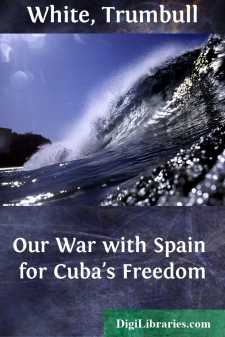Categories
- Antiques & Collectibles 13
- Architecture 36
- Art 48
- Bibles 22
- Biography & Autobiography 813
- Body, Mind & Spirit 142
- Business & Economics 28
- Children's Books 15
- Children's Fiction 12
- Computers 4
- Cooking 94
- Crafts & Hobbies 4
- Drama 346
- Education 46
- Family & Relationships 57
- Fiction 11828
- Games 19
- Gardening 17
- Health & Fitness 34
- History 1377
- House & Home 1
- Humor 147
- Juvenile Fiction 1873
- Juvenile Nonfiction 202
- Language Arts & Disciplines 88
- Law 16
- Literary Collections 686
- Literary Criticism 179
- Mathematics 13
- Medical 41
- Music 40
- Nature 179
- Non-Classifiable 1768
- Performing Arts 7
- Periodicals 1453
- Philosophy 64
- Photography 2
- Poetry 896
- Political Science 203
- Psychology 42
- Reference 154
- Religion 513
- Science 126
- Self-Help 84
- Social Science 81
- Sports & Recreation 34
- Study Aids 3
- Technology & Engineering 59
- Transportation 23
- Travel 463
- True Crime 29
Our War with Spain for Cuba's Freedom
by: Trumbull White
Description:
Excerpt
Information concerning the island of Cuba has been of an exceedingly unsatisfactory character until the search-light of American inquiry was thrown upon it from the beginning of the war for Cuban liberty early in 1895. Although our next-door neighbor to the south, with a perfect winter climate and a host of interesting and picturesque attractions for travelers, tourists had been comparatively few, measured by the numbers that might have been expected. All of the reasons for this were those which naturally followed the characteristic Spanish rule of the island. Publicity was not welcomed, inquiry was not welcomed, travelers were not welcomed. The cities and the accommodations they offered were in many ways far behind those of like age and size in the other countries of the globe. Railway construction and the making of highways had lagged disgracefully, because the exorbitant taxes collected were looted by the officers of the government as their own spoils. No other country so near to the highways of ocean commerce and so accessible from the United States was so little known.
A few travelers had journeyed to Cuba and had written books descriptive of their experiences, which were read with interest by those who had access to them. But these books were usually simply descriptive of the people, the manner of life, the scenery, and the things of surface interest. It is proverbial that Spanish rule conceals the resources of a country instead of exploiting them. The person of inquiring mind had no way in Cuba to obtain prompt information concerning the material facts of the island's wealth of resource, because the Spanish authorities themselves knew nothing about it. Spanish statistics are notoriously unreliable and incomplete. No census of Cuba worthy the name ever has been taken, and there are few schools and few sources of accurate information. With all this handicap it was a foregone conclusion that the casual traveler should confine himself to the things that were visible and that were near to the usual paths of travelers. So until the beginning of the Cuban war for liberty no books could be obtained which told the things which one really cares to know. Picturesque descriptions there were, more than one, of considerable interest, but the information was scattered.
Demand always creates supply, even if material is scant. When the war began, the people of the United States wanted to know something of the people who were striving for their freedom, of their characteristics, their conditions and their personality. Moreover, it was an immediate necessity to know the geography of Cuba, its history, its natural conditions, its material resources, and a host of things that unite to make a comprehensive knowledge of any country. There were men who knew Cuba from years of residence there in industrial and commercial enterprises. They were drawn upon for their knowledge. Then the newspapers of the United States gave another demonstration of their unvarying enterprise and covered the points of interest in the insurrection most exhaustively. Their correspondents shared the camps of insurgent chiefs, witnessed the daring machete charges of the Cubans, saw every detail of armed life in the field. Others kept close watch of the movements of the Spanish forces in Havana and the fortified towns, as well as in the field. One was shot in action. Another was macheted to death after his capture, by a Spanish officer who waited only to be sure that the prisoner was an American before ordering him to death. Others were incarcerated in Morro and Cabanas fortresses and in the other Spanish prisons in Cuba because they insisted on telling the truth to America and the world. They were the ones who told of the horrors of reconcentration under that infamous order of Captain General Weyler. They have been the real historians of Cuba.
It is to all of these sources and others that the information contained in the present volume is owed. The writer takes pleasure in acknowledging the courteous permission to use salient facts contained in some volumes of merit published prior to this time....


